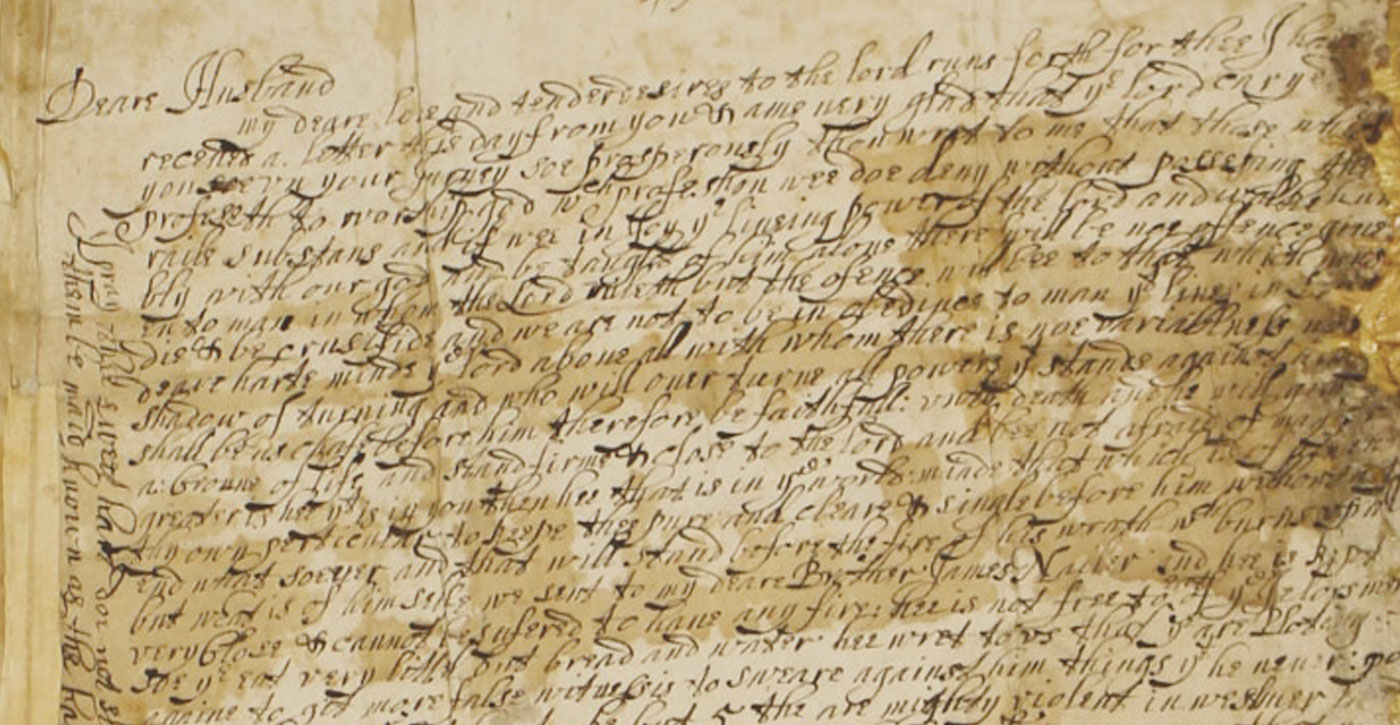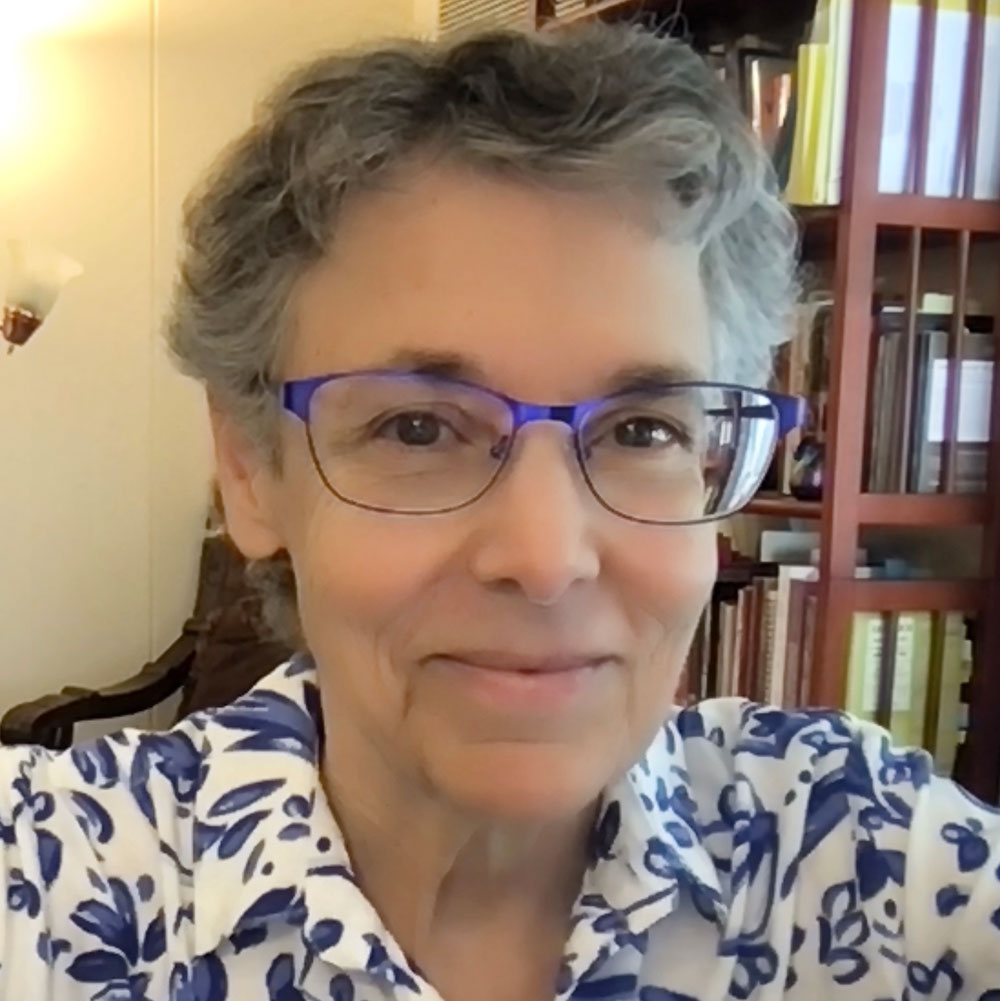Margaret Fell for Modern Friends
This is the first of two articles that present the words of Margaret Fell translated for modern-day Friends. The second article will appear in the December 2025 issue.
For many years, I have loved reading works by early Friends. Margaret Fell, known as “the mother of Quakerism,” wrote letters and epistles that I found to be extraordinarily helpful and inspiring—once I could figure out what she was talking about. First I had to “translate” her words into modern English, make them gender-neutral, and find out the meaning of obscure Christian terms. As I shared these adaptations with other Friends, they found Margaret’s words as relevant, stimulating, and beautiful as I did.
So here is a bit of Margaret’s story and excerpts from one of her letters, along with a few queries for going deeper. They are followed by one of Margaret’s prayers for her readers.
Margaret Fell was an astonishing person. From the spring day in 1652 when she met Quaker minister George Fox and became convinced of the truth of Quaker ways, she threw herself wholeheartedly into the young movement. Margaret made her home into “Quaker Central” for the new Society of Friends of the Truth, while continuing to fulfill her duties as a mother of eight children and the wife of the lord of the manor of Ulverston, England. She and her husband, Judge Thomas Fell, provided various kinds of support for their parish church, including hosting visiting ministers, which is how George Fox happened to turn up. Margaret became a Friend less than one day after meeting him.
Thomas died six years after George’s first visit. Eleven years later, Margaret married George. She was 55; he was 45.
“Stand Still Where the Strength Is” is one of my favorites of Margaret’s letters. It is eloquent and poetic. Margaret wrote it when she was 43, five years after becoming a Quaker. She writes to advise a friend, Col. William Osburne, of the way to be able to “stand still where the strength is”: that strength which overcomes all difficulties.
Margaret’s letters are dense with ideas. Even now when I’m so familiar with her style, I can lose the first part of her thought while concentrating on subsequent thoughts. So I have arranged these lines as poetry.
I recommend reading just a thought or two at a time, a few lines or a stanza, slowly, and aloud if possible. Read as if you’re helping someone else to understand it. Then pause to give it a chance to sink in. Then read it again, and pause again. A few phrases can provide enough food for thought at a sitting; don’t feel you must get through the whole letter at one time.
To begin meeting Margaret’s words, we need to quiet our minds. Life had a much slower pace in her time. Think of how slowly everything moved before there were automobiles and telephones. Patience was a part of everyday living to an extent we can barely imagine. So we must match the speed of our reading with the speed of Margaret’s living and writing.
If you don’t have a practice to still your mind, you can simply do this: take a deep breath, with the desire to s-l-o-w d-o-w-n . . . and now another . . . and one more . . .
My dear friend,
Be faithful to what you already know of God,
and let that show you what needs to be changed in you,
what you can let go of,
be freed of,
so the Light can help you to become more of who you yearn to be.Stay humble,
that the divine tree may take root in you downward,
and upwards you will grow straight and true.
You will be rooted, grounded, into the rock of the Lord,
unshakeable.Storms will not be able to beat you down,
earthquakes unable to loosen your anchor.When troubles and trials come, you will remain sure
and confident, and know a living strength in the Light
and a pure peace.Nothing will be able to take that from you.
So, my dear heart, be humbly regardful of the Divine,
hold fast to Its light,
and life no longer will be a heavy burden.You will be free from what oppresses you,
and that in you which hungers will be fed,
and your thirsty soul will be satisfied.As far as you can, clean out your own house.
When you’ve cleared away what doesn’t belong,
your light will no longer be hidden under masks
or debris
or wounds
but will shine out as if from a lighthouse.
People will see that beacon.So, dear friend, meekly,
humbly,
keep within Spirit’s suggestions for your life,
so what Spirit has planted in you
may thrive.Some divine weeding needs to be done.
What God has not planted in you,
pull it up.
What God has planted,
let it be pruned
and shaped
and
sheltered
to have the greatest possible growth.Be purely that which twines up and around the Divine.
May you be upheld by a belief
unsullied by human motivations:
a pure belief
which is not quick to act
but stands still where the strength is.
This is the strength that overcomes all difficulties.
Notice that Margaret says when, not if, “troubles and trials come.” Unfortunately, troubles are likely for all of us at times.
Queries
- Am I willing to let go of my own ideas about what my life is about, so that I can discover what the divine Friend has planted in me?
- Am I willing to be pruned and shaped? Am I willing to be so only if God makes certain promises to me in return?
This prayer is from Margaret to you:
I pour out prayers to the Compassionate Heart of Everlasting Love
to hold and keep you all
in the light
and life
and power
and presence
and that you rest there forever.From your dear friend and sister in the Lord,
Margaret Fell
Additional materials
The original text is below, along with sources and other information.
About the “spring day” when Margaret met George Fox:
According to Maria Webb, a descendant of the Fells, the first Friends meeting was held at Swarthmoor Hall just three days after Judge Thomas Fell returned home to find his household converted to Quakerism. After spending some time with George Fox and others, Fell agreed to allow meetings for worship at the Hall. The first one was on a Saturday in May of 1652. [Maria Webb, The Fells of Swarthmoor Hall and Their Friends, 1865. Book digitized by Google from the library of Oxford University; also available via the Internet Archive.]
Margaret’s friend Thomas Camm, writing in 1706, a half century after the first meeting, gives a slightly different date. He says that the time that Fox “came among us” was “Fourth month” (June in our time) and “a few weeks later” as his arrival at Swarthmoor Hall. This is only a month’s difference, but I want the scholars among you to be satisfied. [Thomas Camm, “Testimony Concerning our Dear and Honoured Friend Margaret Fox,” part of Margaret’s collected writings. The first part of the title of Margaret’s collected works is A Brief Collection of Remarkable Passages and Occurrences. This is known in short as Works. It’s online at Earlham School of Religion’s Digital Quaker Collection; here’s the direct link to Camm’s testimony.]
Original letter:
Willm Osborne
My dear love is to thee, dear heart, wait and be faithful to thy measure of the good word of God, which thou have received, that with it that thou may see, that which is contrary cut down, and the axe that is laid to the root of the tree [Luke 3:9] keep it there, that the fruits may be brought forth meet for repentance, and let the voice cry through the wilderness, that every tree that grows there may be cut down that the way may be prepared for him, and the paths made straight and every mountain and hill laid low, and the rough ways made smooth [Luke 3:5] . . . and so do keep low at the bottom, that the tree . . . may take root downward and upward, that so thy growth may be true, rooted and grounded into the rock, unmovable, that the storms and tempests cannot beat down, that when troubles and trials and afflictions come, thou may know a sure habitation, and portion, and living strength in the Lord and a pure peace which cannot be taken from thee, so, my dear heart, low in the fear of the Lord wait, and keep fast to the Lord, that the heavy burden may be undone . . . and the oppressed may have freedom, and the hungry may have bread, & the soul that thirsts may be satisfied . . . and so my dear heart, low, low, to thy own measure keep, that the pure plant may arise, where the unity is, which my heavenly Father planted, and every plant that he planted not, let it be cut down . . . and so the Lord God of life and power keep thee faithful and obedient, low in his fear to wait, in the pure belief, which makes not haste but stands still where the strength is, and this is that, that overcomes.
[unsigned]
This appears as letter 73 (page 241) in Undaunted Zeal: The Letters of Margaret Fell edited and introduced by Elsa F. Glines (Friends United Press, 2003).
Original prayer:
Note: at that time, “bowels” referred to the heart, the seat of the emotions.
My dear love is freely given unto you all, who has a perfect sense of your sufferings, and my life and bowels is [sic] freely poured forth unto the Lord for the preservation and keeping of you all, in His own name and in His own light and life and power where His presence and life may rest upon you forever.
This appears in Undaunted Zeal as letter 129 (page 386).






Comments on Friendsjournal.org may be used in the Forum of the print magazine and may be edited for length and clarity.